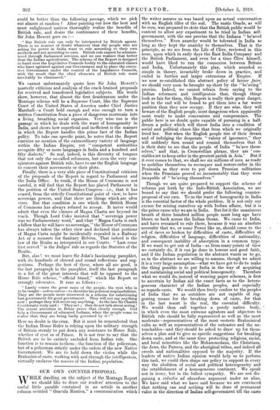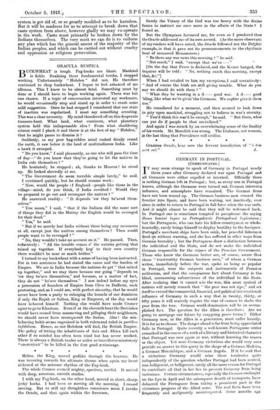OUR OWN COUNTER-PROPOSAL.
WHILE dwelling on the subject of the Montagu Report we should like to draw our readers' attention to the useful little parable contained in an article in another column entitled " Oracula Rustica," a communication which the writer assures us was based upon an actual conversation with an English tiller of the soil. The rustic Oracle, as will be seen, was prepared to state that the British public would be content to allow any experiment to be tried in Indian self- government, with the one proviso that the Indians " be'aved themselves." Even anarchy would be tolerated in India as long as they kept the anarchy to themselves. That is the principle, as we see from the Life of Clive, reviewed in this issue, upon which in early days the East India Company and the British Parliament, and even for a time Clive himself, would have liked to run the connexion between Britain and India, Unfortunately this plan, which sounded so simple in theory, invariably broke down in practice, and ended in further and larger extensions of Empire. If we now re-established this abstract policy of laisser faire, we should very soon be brought up short by the " be'aving " proviso. Indeed, we cannot refrain from saying to the Indian reformers and intelligentsia that, though things look so fair for them, this Report is really their great danger, and in the end will be found to get them into a far worse position than they now occupy. If they are wise, they will beware of the English people, most dangerous when apparently most ready to make concessions and compromises. The public here is no doubt quite capable of pursuing in a half- dream a policy which will throw India into a condition of social and political chaos like that from which we originally freed her. But when the English people tire of their dream and of indulging the desperate "valour of ignorance," they will suddenly turn round and remind themselves that it is their duty to see that the people of India " be'ave them- selves," and that, in Cromwellian phrase, they are 'con- stables set to keep order in the greatest parish in Asia.' But if it ever comes to that, we shall see six millions of men as ready to mobilize themselves to reconquer and restore order in the Peninsula as they were to put down Prussian militarism when the Prussians proved so incontestably that they were incapable of " be'aving themselves."
Though we are quite prepared to support the scheme of reforms put forth by the Indo-British Association, we are bound to say that we should prefer the following counter- proposal of our own. To us the want of homogeneity in India is the essential factor of the whole problem. It is not only our excuse for mixing ourselves up with Indian affairs, but it is the prime cause why we are in India. But for it the unanimous breath of three hundred million people must long ago have blown us back across the Indian Ocean. We came to India, and have remained to rule there, because it was an absolute necessity that we, or some Power like us, should come to the aid of races so broken by difficulties of caste, difficulties of religion, difficulties of language, difficulties of nationality, and consequent inability of absorption in a common type. If we want to get out of India—as from many points of view we certainly do, if it can De done in honour and good faith, and if the Indian population in the abstract wants us to go, as in the abstract we are willing to assume, though we admit it is a very large assumption—what we have got to do to make the thing possible is to put India in the way of acquiring and maintaining social and political homogeneity. Therefore what we would do, instead of weaving paper schemes, is first to ascertain by Indian aid the exact facts as to the hetero- geneous character of the Indian peoples, and especially as regards caste. We would then freely confess to the peoples of India that we as outsiders are not capable of sug- gesting means for the breaking down of caste, for that in the last resort is the real, the essential difficulty. We would then call together a purely native body, in which even the most extreme agitators and objectors to British rule should be fully represented as well as the most moderate—representatives of the most esoteric Brahminical cults as well as representatives of the outcastes and the un- touchables—and they should be asked to draw up for them- selves a plan and to give us specific suggestions for breaking down caste, and at the same time protecting religious, racial, and local minorities like the Mohammedans, the Christians, the Jews, the Parsees, and the aboriginal tribes, and indeed all creeds and nationalities opposed to the majority. If the leaders of native Indian opinion would help us to perform this task, we could then shape our policy to support in every way the abolition of social and political heterogeneity and the establishment of a homogeneous continent. We speak not in irony, but in the fullest sympathy. We are not dis- guising a reductio ad absurdum argument under an alias. We have said what we have said because we are convinced that nothing can and nothing will be done of permanent value in the direction of Indian self-government till the caste system is got rid of, or so greatly modified as to be harmless. But it will be madness for us to attempt to break down that caste system from above, however gladly we may co-operate in the work. Caste must primarily be broken down by the Indians themselves. The very most we can do is to endorse any plan which has the general assent of the majority of the Indian peoples, and. which can be carried out without cruelty and oppression or religious persecution.



































 Previous page
Previous page